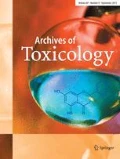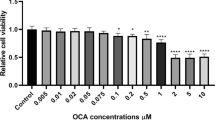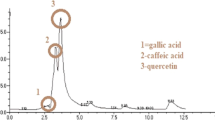Abstract
As one of the isoprenoids and widely derived from many fruits and vegetables, β-ionone (BI) has a potent inhibitory proliferation of cancer cells in vitro and in vivo. However, its exact mechanism is still uncompleted understood and needs to be further verified. Cyclooxygenase-2 (COX-2), as a potential target of cancer chemoprevention, has been played pivotal roles in proliferation of tumor cells and carcinogenesis. Thus, the objective of present study was to determine that BI inhibited the activity of COX-2 in breast cancer and related to cancer cell models. Cell proliferation, DNA synthesis, the distribution of cell cycle, apoptosis induction and the expression of P38-MAPK protein were determined in MCF-7 cells by methylene blue, 3H-thymidine (TdR) incorporation, flow cytometry, TUNEL and Western blotting assays. Quinone reductase (QR) activity was determined in murine hepatoma Hepa1c1c7 cells by enzyme-linked immunosorbent assay (ELISA). The expression of COX-2 in a phorbol-12-myristate-13-acetate (PMA)-induced cell model and mammary tumor tissues was examined by Western blotting and immunohistochemistry. The results showed that BI significantly inhibited cell proliferation and DNA synthesis, arrested the distribution of cell cycle at the S phase or decreased proteins related to cell cycle such as cyclin D1 and CDK4, induced apoptosis and increased the expression of p-P38 in MCF-7 cells. BI at low doses (< 50 μmol/L) significantly increased QR activity, decreased the expression of COX-2 protein and prostaglandin E2 (PEG2) release in cell models. In addition, BI also significantly decreased the expression of COX-2 protein in rat mammary tumor tissues. Therefore, our findings indicate that BI possesses inhibitory proliferation of breast cancer cells through down-regulation of COX-2 activity.







Similar content being viewed by others
References
Ansari M, Emami S (2016) beta-Ionone and its analogs as promising anticancer agents. Eur J Med Chem 123:141–154. https://doi.org/10.1016/j.ejmech.2016.07.037
Asokkumar S, Naveenkumar C, Raghunandhakumar S et al (2012) Antiproliferative and antioxidant potential of beta-ionone against benzo(a)pyrene-induced lung carcinogenesis in Swiss albino mice. Mol Cell Biochem 363(1–2):335–345. https://doi.org/10.1007/s11010-011-1186-6
Aumeeruddy MZ, Mahomoodally MF (2019) Combating breast cancer using combination therapy with three phytochemicals: piperine, sulforaphane, and thymoquinone. Cancer. https://doi.org/10.1002/cncr.32022
Cardozo MT, de Conti A, Ong TP et al (2011) Chemopreventive effects of beta-ionone and geraniol during rat hepatocarcinogenesis promotion: distinct actions on cell proliferation, apoptosis, HMGCoA reductase, and RhoA. J Nutr Biochem 22(2):130–135. https://doi.org/10.1016/j.jnutbio.2009.12.007
Doll R, Peto R (1981) The causes of cancer: quantitative estimates of avoidable risks of cancer in the United States today. J Natl Cancer Inst 66(6):1191–1308
Dong HW, Zhang S, Sun WG et al (2013) beta-Ionone arrests cell cycle of gastric carcinoma cancer cells by a MAPK pathway. Arch Toxicol 87(10):1797–1808. https://doi.org/10.1007/s00204-013-1041-5
Duncan RE, Lau D, El-Sohemy A, Archer MC (2004) Geraniol and beta-ionone inhibit proliferation, cell cycle progression, and cyclin-dependent kinase 2 activity in MCF-7 breast cancer cells independent of effects on HMG-CoA reductase activity. Biochem Pharmacol 68(9):1739–1747
Ferlay J, Colombet M, Soerjomataram I et al (2018) Estimating the global cancer incidence and mortality in 2018: GLOBOCAN sources and methods. Int J Cancer. https://doi.org/10.1002/ijc.31937
Ghosh N, Chaki R, Mandal V, Mandal SC (2010) COX-2 as a target for cancer chemotherapy. Pharmacol Rep 62(2):233–244
Harris RE, Beebe-Donk J, Doss H, Burr Doss D (2005) Aspirin, ibuprofen, and other non-steroidal anti-inflammatory drugs in cancer prevention: a critical review of non-selective COX-2 blockade (review). Oncol Rep 13(4):559–583
Harris RE, Beebe-Donk J, Alshafie GA (2007) Cancer chemoprevention by cyclooxygenase 2 (COX-2) blockade: results of case control studies. Subcell Biochem 42:193–212
Hashemi Goradel N, Najafi M, Salehi E, Farhood B, Mortezaee K (2019) Cyclooxygenase-2 in cancer: a review. J Cell Physiol 234(5):5683–5699. https://doi.org/10.1002/jcp.27411
He L, Mo H, Hadisusilo S, Qureshi AA, Elson CE (1997) Isoprenoids suppress the growth of murine B16 melanomas in vitro and in vivo. J Nutr 127(5):668–674
Janakiram NB, Cooma I, Mohammed A, Steele VE, Rao CV (2008) Beta-ionone inhibits colonic aberrant crypt foci formation in rats, suppresses cell growth, and induces retinoid X receptor-alpha in human colon cancer cells. Mol Cancer Ther 7(1):181–190
Jones S, Fernandes NV, Yeganehjoo H et al (2013) Beta-ionone induces cell cycle arrest and apoptosis in human prostate tumor cells. Nutr Cancer 65(4):600–610. https://doi.org/10.1080/01635581.2013.776091
Kim SO, Chun KS, Kundu JK, Surh YJ (2004) Inhibitory effects of [6]-gingerol on PMA-induced COX-2 expression and activation of NF-kappaB and p38 MAPK in mouse skin. BioFactors 21(1–4):27–31
Kim MO, Moon DO, Kang CH, Kwon TK, Choi YH, Kim GY (2010) Beta-ionone enhances TRAIL-induced apoptosis in hepatocellular carcinoma cells through Sp1-dependent upregulation of DR5 and downregulation of NF-kappaB activity. Mol Cancer Ther 9(4):833–843. https://doi.org/10.1158/1535-7163.MCT-09-0610
Lee KH, Abas F, Mohamed Alitheen NB et al (2015) Chemopreventive effects of a curcumin-like diarylpentanoid [2,6-bis(2,5-dimethoxybenzylidene)cyclohexanone] in cellular targets of rheumatoid arthritis in vitro. Int J Rheum Dis 18(6):616–627. https://doi.org/10.1111/1756-185X.12341
Liu JR, Chen BQ, Yang BF et al (2004a) Apoptosis of human gastric adenocarcinoma cells induced by beta-ionone. World J Gastroenterol 10(3):348–351
Liu JR, Yang BF, Chen BQ, Yang YM, Dong HW, Song YQ (2004b) Inhibition of beta-ionone on SGC-7901 cell proliferation and upregulation of metalloproteinases-1 and -2 expression. World J Gastroenterol 10(2):167–171
Liu JR, Yang YM, Dong HW, Sun XR (2005) Effect of beta-ionone in human mammary cancer cells (Er-) by MAPK pathway. Wei sheng yan jiu J Hygiene Res 34(6):706–709
Liu JR, Sun XR, Dong HW et al (2008) Beta-ionone suppresses mammary carcinogenesis, proliferative activity and induces apoptosis in the mammary gland of the Sprague-Dawley rat. Int J Cancer 122(12):2689–2698
Liu JR, Dong HW, Chen BQ, Zhao P, Liu RH (2009a) Fresh apples suppress mammary carcinogenesis and proliferative activity and induce apoptosis in mammary tumors of the Sprague-Dawley rat. J Agric Food Chem 57(1):297–304
Liu M, Lin L-Q, Song B-B et al (2009b) Cranberry phytochemical extract inhibits SGC-7901 cell growth and human tumor xenografts in Balb/c nu/nu mice. J Agric Food Chem 57(2):762–768
Liu JR, Dong HW, Sun XR et al (2010) Effects of beta-ionone on mammary carcinogenesis and antioxidant status in rats treated with DMBA. Nutr Cancer 62(1):58–65
Liu Q, Dong HW, Sun WG et al (2013) Apoptosis initiation of beta-ionone in SGC-7901 gastric carcinoma cancer cells via a PI3K-AKT pathway. Arch Toxicol 87(3):481–490. https://doi.org/10.1007/s00204-012-0962-8
Mo H, Elson CE (1999) Apoptosis and cell-cycle arrest in human and murine tumor cells are initiated by isoprenoids. J Nutr 129(4):804–813
Mortezaee K, Salehi E, Mirtavoos-Mahyari H et al (2019) Mechanisms of apoptosis modulation by curcumin: implications for cancer therapy. J Cell Physiol 234(8):12537–12550. https://doi.org/10.1002/jcp.28122
Ohuchi K, Watanabe M, Yoshizawa K et al (1985) Stimulation of prostaglandin E2 production by 12-O-tetradecanoylphorbol 13-acetate (TPA)-type and non-TPA-type tumor promoters in macrophages and its inhibition by cycloheximide. Biochem Biophys Acta 834(1):42–47
Pan MH, Lai CS, Wang H, Lo CY, Ho CT, Li SM (2013) Black tea in chemo-prevention of cancer and other human diseases. Food Sci Hum Wellness 2(1):12–21. https://doi.org/10.1016/j.fshw.2013.03.004
Shan LH, Sun WG, Han W et al (2012) Roles of fibroblasts from the interface zone in invasion, migration, proliferation and apoptosis of gastric adenocarcinoma. J Clin Pathol 65(10):888–895. https://doi.org/10.1136/jclinpath-2012-200909
Sharma V, Chaudhry A, Chashoo G et al (2014) beta-Ionone derived apoptosis inducing endoperoxides; discovery of potent leads for anticancer agents. Eur J Med Chem 87:228–236. https://doi.org/10.1016/j.ejmech.2014.09.049
Shen J, Zhang Y, Shen H et al (2018) The synergistic effect of 2,3,5,4′-tetrahydroxystilbene-2-O-beta-d-glucoside combined with Adriamycin on MCF-7 breast cancer cells. Drug Des Devel Ther 12:4083–4094. https://doi.org/10.2147/DDDT.S186028
Singh AP, Singh R, Verma SS et al (2019) Health benefits of resveratrol: evidence from clinical studies. Med Res Rev. https://doi.org/10.1002/med.21565
Sun W, Xu W, Liu H et al (2009) Gamma-tocotrienol induces mitochondria-mediated apoptosis in human gastric adenocarcinoma SGC-7901 cells. J Nutr Biochem 20(4):276–284
Sun WG, Song RP, Wang Y et al (2019) r-Tocotrienol inhibits cell proliferation of human gastric cancer by regulating nuclear factor-kB activity. J Agric Food Chem. https://doi.org/10.1021/acs.jafc.8b05832
Vieira A, Heidor R, Cardozo MT et al (2011) Efficacy of geraniol but not of beta-ionone or their combination for the chemoprevention of rat colon carcinogenesis. Braz J Med Biol Res 44(6):538–545
Wang R-F, Zhang L-H, Shan L-H et al (2013) Effects of the fibroblast activation protein on the invasion and migration of gastric cancer. Exp Mol Pathol 95(3):350–356
Wang P, Peng X, Wei ZF et al (2015) Geraniin exerts cytoprotective effect against cellular oxidative stress by upregulation of Nrf2-mediated antioxidant enzyme expression via PI3K/AKT and ERK1/2 pathway. Biochem Biophys Acta 1850(9):1751–1761. https://doi.org/10.1016/j.bbagen.2015.04.010
Yang J, Liu RH (2009) Induction of phase II enzyme, quinone reductase, in murine hepatoma cells in vitro by grape extracts and selected phytochemicals. Food Chem 114:898–904
Yu R, Lei W, Mandlekar S et al (1999) Role of a mitogen-activated protein kinase pathway in the induction of phase II detoxifying enzymes by chemicals. J Biol Chem 274(39):27545–27552. https://doi.org/10.1074/jbc.274.39.27545
Yu R, Mandlekar S, Lei W, Fahl WE, Tan TH, Kong AN (2000) p38 Mitogen-activated protein kinase negatively regulates the induction of phase II drug-metabolizing enzymes that detoxify carcinogens. J Biol Chem 275(4):2322–2327. https://doi.org/10.1074/jbc.275.4.2322
Zhang W, Liu HT (2002) MAPK signal pathways in the regulation of cell proliferation in mammalian cells. Cell Res 12(1):9–18
Zhang YH, Ma K, Liu JR et al (2018) Gamma-tocotrienol inhibits the invasion and migration of human gastric cancer cells through downregulation of cyclooxygenase-2 expression. Oncol Rep 40(2):999–1007. https://doi.org/10.3892/or.2018.6497
Zykova TA, Zhu F, Zhai X et al (2008) Resveratrol directly targets COX-2 to inhibit carcinogenesis. Mol Carcinog 47(10):797–805. https://doi.org/10.1002/mc.20437
Acknowledgements
This research was supported by Harbin Science and Technology Innovation Talent Research Special Fund (No. 2017RALXJ005), National Natural Science Fund (No. 30200229) and Health and Family Planning Commission Research Fund of Heilongjiang (2003-125), People’s Republic of China.
Author information
Authors and Affiliations
Corresponding authors
Ethics declarations
Conflict of interest
There are no conflicts of interest in this study.
Additional information
Publisher's Note
Springer Nature remains neutral with regard to jurisdictional claims in published maps and institutional affiliations.
Electronic supplementary material
Below is the link to the electronic supplementary material.
Rights and permissions
About this article
Cite this article
Dong, HW., Wang, K., Chang, XX. et al. Beta-ionone-inhibited proliferation of breast cancer cells by inhibited COX-2 activity. Arch Toxicol 93, 2993–3003 (2019). https://doi.org/10.1007/s00204-019-02550-2
Received:
Accepted:
Published:
Issue Date:
DOI: https://doi.org/10.1007/s00204-019-02550-2




